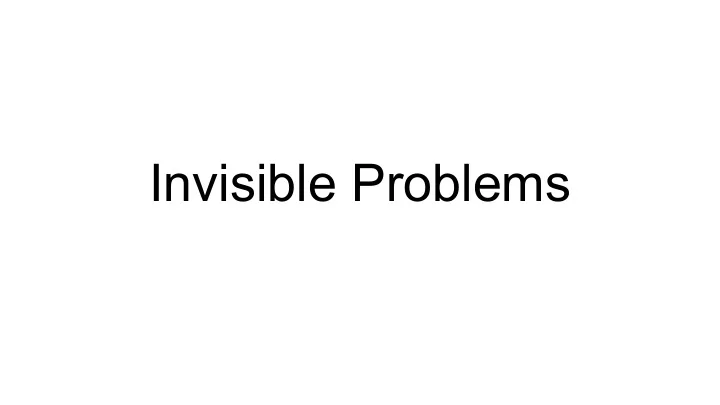

Invisible Problems
On the job Let’s imagine being a C++ programmer We are ok with the language, but not super secure We are tasked with upgrading a part of an older system And in the section we are now, the best solution is a struct with two integers
Lets do this struct VeryImportant { int myOne; int myTwo; };
“Please make sure everything is So far, so good correctly initialized, we can’t have junk values here!”
Zero is default? Right? struct VeryImportant { int myOne; int myTwo; VeryImportant(): myOne(0), myTwo(0) {} };
“I want to be able to set the values when I create the object!”
We got this! struct VeryImportant { int myOne; int myTwo; VeryImportant(): myOne(0), myTwo(0) {} VeryImportant(int aOne, int aTwo) : myOne(aOne), myTwo(aTwo) {} };
“This object has to be correct Oh no... when it’s copied, can you do that?”
The rule of how many? struct VeryImportant { int myOne; int myTwo; VeryImportant(): myOne(0), myTwo(0) {} VeryImportant(int aOne, int aTwo): myOne(aOne), myTwo(aTwo) {} VeryImportant(const VeryImportant& aVery) : myOne(aVery.myOne), myTwo(aVery.myTwo) {} VeryImportant& operator=(const VeryImportant& aVery) { myOne = aVery.myOne; myTwo = aVery.myTwo; return *this; } };
“We upgraded to the new compiler, it supports move semantics, can you make sure everything is movable?”
struct VeryImportant { int myOne; int myTwo; VeryImportant(): myOne(0), myTwo(0) {} VeryImportant(int aOne, int aTwo): myOne(aOne), myTwo(aTwo) {} VeryImportant(const VeryImportant& aVery) : myOne(aVery.myOne), myTwo(aVery.myTwo) {} VeryImportant& operator=(const VeryImportant& aVery) { myOne = aVery.myOne; myTwo = aVery.myTwo; return *this; } VeryImportant(VeryImportant&& aVery) : myOne(aVery.myOne), myTwo(aVery.myTwo) {} VeryImportant& operator=(VeryImportant&& aVery) { myOne = aVery.myOne; myTwo = aVery.myTwo; return *this; } };
“Why is our new VeryImportant struct slower than our old library?”
Searching starts You look over your code, nothing
Searching starts You look over your code, nothing You look at all the call sites, nothing
Searching starts You look over your code, nothing You look at all the call sites, nothing You start doing git blame diffs, nothing
Searching starts You look over your code, nothing You look at all the call sites, nothing You start doing git blame diffs, nothing You go into assembly...
“Why is my code slow?” You start googling something like that Sprinkle in memcpy and structs A certain word keeps popping up
“Why is my code slow?” You start googling something like that Sprinkle in memcpy and structs A certain word keeps popping up Trivial
“Objects of trivially-copyable types are the only C++ objects that may be safely copied with std::memcpy”
struct VeryImportant { int myOne; int myTwo; VeryImportant(): myOne(0), myTwo(0) {} VeryImportant(int aOne, int aTwo): myOne(aOne), myTwo(aTwo) {} VeryImportant(const VeryImportant& aVery) : myOne(aVery.myOne), myTwo(aVery.myTwo) {} VeryImportant& operator=(const VeryImportant& aVery) { myOne = aVery.myOne; myTwo = aVery.myTwo; return *this; } VeryImportant(VeryImportant&& aVery) : myOne(aVery.myOne), myTwo(aVery.myTwo) {} VeryImportant& operator=(VeryImportant&& aVery) { myOne = aVery.myOne; myTwo = aVery.myTwo; return *this; } };
We’re back here struct VeryImportant { int myOne; int myTwo; VeryImportant(): myOne(0), myTwo(0) {} VeryImportant(int aOne, int aTwo): myOne(aOne), myTwo(aTwo) {} };
The only healthy choice...
#define ENFORCE_TRIVIAL(t) \ static_assert(std::is_standard_layout_v<t>); \ static_assert(std::is_trivially_copyable_v<t>); \ static_assert(std::is_trivially_copy_assignable_v<t>); \ static_assert(std::is_trivially_copy_constructible_v<t>); \ static_assert(std::is_trivially_move_assignable_v<t>); \ static_assert(std::is_trivially_move_constructible_v<t>); \ static_assert(std::is_trivially_destructible_v<t>); #define TRIVIAL_STRUCT(name, ...) \ struct name __VA_ARGS__; \ ENFORCE_TRIVIAL(name);
TRIVIAL_STRUCT(VeryImportant, { int myOne; int myTwo; VeryImportant(): myOne(0), myTwo(0) {} VeryImportant(int aOne, int aTwo): myOne(aOne), myTwo(aTwo) {} });
My wish struct [[bikeshed_trivially_copyable]] VeryImportant { int myOne; int myTwo; VeryImportant(): myOne(0), myTwo(0) {} VeryImportant(int aOne, int aTwo) : myOne(aOne), myTwo(aTwo) {} };
My wish struct [[bikeshed_trivially_copyable]] VeryImportant { int myOne; int myTwo; VeryImportant(): myOne(0), myTwo(0) {} VeryImportant(int aOne, int aTwo): myOne(aOne), myTwo(aTwo) {} VeryImportant(const VeryImportant& aVery) : myOne(aVery.myOne), myTwo(aVery.myTwo) {} // Compile Error };
Twitter: @olafurw
Recommend
More recommend